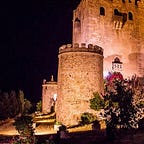SUPER TYPHOON GONI, LOCALLY CALLED ‘ROLLY’
Nipa Hut Inhabited By Humans Is Better Than Rock-Made House Inhabited By Owls
Massive destruction left by Goni in a Philippine village
The countryside lifestyle of the poorest of the poor in the Philippines remains unchanged as it was prior to the arrival of Spanish conquistadores in 1565, 44 years after the Portuguese explorer Ferdinand Magellan landed in the islands now called the Philippines.
Above is a picture that depicts the life of an ordinary family of a father, a single parent, taking care of his two children. As he was unable to go to school himself when he was still young because of financial problems, he knows how difficult it is to live without proper education. Thus, he’s selling coconuts to put food on their table and support his daughters’ education in the village’s elementary school.
November 6, 2020. Six days after the super typhoon destroyed most houses in their village, the power supply has not yet been restored. Every family is still busy trying to reconstruct their houses.
Do you want to help rebuild the lives of families affected?
We set up a fundraising activity for about 1,500 families in a small village with fascinating history since before the Spanish colonialism in 1565.
The village is where two Spanish galleons were built in 1610. See Galleons.
The village is where the first English-speaking school was first opened in a little chapel by an American teacher on a mission in 1910. See Memoir.
The village is called Dalupaon. See History.
Check our Facebook page on fb.com/dalupaon.
The funds that we are raising will enable us to rebuild more lives affected by the super typhoon that battered the Philippines, including this village that played a vital role in the world’s history.
Check us on GoGetFunding to see more photos and/or to donate.
Email us at info@dalupaon.com
English: Thank you very much.
Spanish: Muchas gracias.
Tagalog: Maraming salamat.
Bicol: Dios mabalos.
